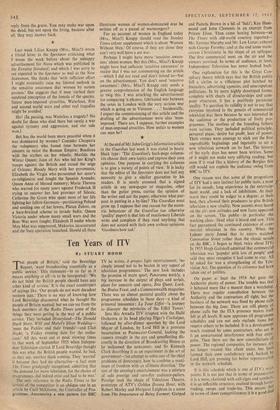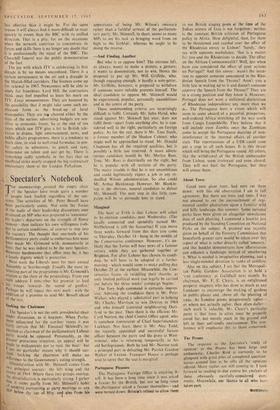Ten Years of ITV
By STUART HOOD ‘711-1E people of Britain,' said the Beveridge
I Report, 'want broadcasting essentially as a public service.' This statement—in so far as it means anything at all—is to be interpreted: 'We do not think the British people should have any other kind of service.' It is the exact counterpart of sayings like: 'Our people do not want decadent western jazz.' There is no way of knowing how Lord Beveridge discovered what he thought the people of Britain wanted; but we can see from the back numbers of the Radio Times some of the things they were getting in the way of a public service. They included Disneyland—The Donald Duck Story, Will and Mabel's Silver Wedding— 'meet the Pickles and their friends'—and Club Night, 'a Friday evening date for the enthu- siast.' All this Went out at peak viewing times in that week of September 1955 when Indepen- dent Television started. If Lord Beveridge thoUght this was what the British people wanted, he had, as they say, another think coming. They 'wanted' it because they had no alternative—a fact even The Times grudgingly recognised, admitting that 'the demand for more television, for the choice of programmes, did indeed exist and had to be met.'
The only reference in the Radio Times to the arrival of the competitor is an oblique one in an article by Cecil McGivern, the Controller of Pro- grammes. Announcing a new pattern for BBC TV he writes, a propos• light entertainment, 'we simply intend not to be beaten in any aspect of television programmes.' The new look includes the promise of more sport, Panorama weekly, a big increase in the output of plays and serials, plans for concerts and opera, Zoo Quest, Look, the Brains Trust, and a Commonwealth magazine. There was an almost pastoral quality about the programme schedules in those days—a kind of primeval innocence: La Tour Eiffel—`a journey to discover the mysteries of the Eiffel Tower.'
Into this Arcadia ITV irrupted with the Halld Orchestra at its head playing Elgar's Cockaigne, followed by after-dinner speeches by the Lord Mayor of London, by Lord Hill in a previous incarnation as Postmaster-General, looking the camera straight in the eye and genuflecting dis- creetly in the direction of Broadcasting House as he welcomed the newcomer, and Sir Kenneth Clark describing it as an experiment in the art of government—`an attempt to solve one of the chief problems of democracy, how to combine a maxi- mum of freedom with an ultimate direction.' The rest of the evening's entertainment was a mixture of safe prestige and sure-fire audience-pullers. Prestige took the shape of Television Theatre, prototype of ATV's Golden Drama Hour, with Robert Morley and Margaret Leighton in a scene from The Importance of Being Earnest; Gielgud and Pamela Brown in a bit of `Saki'; Kay Ham- mond and John Clements in an excerpt from Private Lives. Then came boxing between—as The Times with old-world courtesy reported— Mr. Terence Murphy and Mr. Lew Lazar; cabaret with George Formby; and at the end some main- stream Christianity in the shape of an epilogue. The first commercial went on the air and the viewers survived. In terms of audience, at least, Independent Television has never looked back.
One explanation for this is the Great Con- spiracy theory which says that the British public fell a victim to a villainous plot hatched by financiers, advertising agencies, and unscrupulous politicians. In its more highly developed forms, complete with charts of directorships and com- pany structures, it has a positively paranoiac quality. To question its validity is not to say that everyone involved in the genesis of commercial television was there because he was interested in the audience or the production of lively pro- grammes. The motives of the founding fathers were various. They included political principle, personal pique, desire for profit, love of power. Their virtues were courage to stick out the first unprofitable beginnings and ingenuity to set a new television network on its feet. The history IA the early days has never been written. Some of it might not make very edifying reading; but even if it read like a history of the Borgias this still would not explain the audience swing from BBC to ITV.
One reason was that some of the progenitors of ITV had a sure instinct for public taste, a nose for its moods, long experience in the entertain- ment world, and a lack of inhibitions. At their worst they could be vulgar to a degree; at their best, they allowed their producers to give British television a new vitality. New accents were heard, on the air: new attitudes and new faces appeared on the screen. The public - in particular the working class—liked what it heard and saw. This. fact guaranteed the continued existence of corn- mercial television in this country. When the, Labour party found that its voters watched Coronation Street rather than the classic serials! on the BBC, it began to think twice about ITVo In 1955 Hugh Gaitskell admitted that commercial! television was 'popular with lots of people' and said they must recognise it had come to stay. All he asked for was a strengthening of the Tele- vision Act. The question of its existence had been, taken out of politics.
On paper at least the 1954 Act gave the Authority plenty of power. The trouble was that it behaved more like a mascot than a watchdog. There was regular consultation between the Authority and the contractors all right, but the business of the network was fixed by phone calls between the big four. There are still plenty of phone calls but the ITA presence makes itself felt at all levels. It now approves all programme schedules and can not only exclude items but require others to be included. It is a development much resented by some contractors, who see In it an unwarranted interference with free enter- prise. Then there are the new constellations of
power. The regional companies, for instance, arc no longer treated like client states but have
formed their own confederacy and, backed by Lord Hill, are pressing for better representaua in the network schedule.
It is this schedule which is one of ITV's weak points. It is not just that in terms of presentation it is a mess, cluttered with call-signs and symholc, it is an inflexible structure, evolved through horse- trading, swops and trade-ins. This means that in terms of sheer competitiveness it is a good des' e; less effective than it might be. For the same reason it will always find it more difficult to react quickly to events than the BBC with its unified direction. That is a pity. for on the occasions when the network contrives to concentrate its forces and skills there is no longer any doubt that it is professionally the equal of the BBC. The Churchill funeral was the public demonstration of the fact.
The joy with which ITV is celebrating its first decade is by no means unconfined. There is a certain nervousness in the air and a draught in the Muzak-filled corridors. The licences come up for renewal in 1967. Newcomers will be able to apply for franchises. Lord Hill. the contractors think. may feel impelled to leave his mark on ITV. Exegi monamentant. They are haunted by the possibility that it might take some such un- Pleasant form as the break-up of local monopolies. They are nest cheered either by the stale of the nation; advertising budgets are sen- sitive to economic frosts. So at the .end of ten Years which saw ITV give a lot to British tele- vision in drama. light entertainment, news, and Public affairs programmes, there is a tendency to mark time, to stick to well-tried formulae, to pre- fer safety to adventure, to pinch and save, economise on talent and just get by. There is something sadly symbolic in the fact that an unofficial strike nearly stopped the big razzmatazz anniversary show ,at the London Palladium.































 Previous page
Previous page